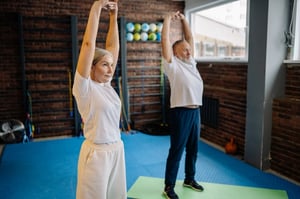Do you often wake up feeling stiff or aching? Do you have trouble getting out of bed in the morning...
11 Habits That Are Hurting Your Flexibility and Range of Motion
As we age, maintaining flexibility and range of motion becomes increasingly important for our overall health and well-being. Unfortunately, many of us fall into habits that can actually hinder our ability to move freely and comfortably. In this blog post, we'll explore 11 common habits that can be particularly detrimental to older adults' flexibility and range of motion.
From sitting for long periods of time to neglecting stretching and mobility exercises, many everyday habits can impact our ability to move with ease. By identifying these habits and making simple changes, older adults can work to improve their flexibility and range of motion, reducing the risk of injury and enhancing their quality of life. Whether you're looking to prevent stiffness and discomfort or simply want to maintain your ability to perform everyday tasks, this post will provide valuable insights into the habits that may be holding you back, as well as tips for building healthier habits that promote greater flexibility and range of motion.
11 Reasons Your Flexibility is Hurting
-
Sleeping On Hard Surfaces
This is the worst thing you can do for your back flexibility and range of motion. Sleeping on a hard surface reduces blood flow to spinal discs, which may lead to chronic pain in the lower back area. Try using a memory foam mattress or pillows that will provide comfort while getting your beauty sleep. It is vital to get the right amount of sleep and to keep a good posture while sleeping.
-
Using Improper Form when Exercising
It's important to maintain correct posture throughout each exercise to avoid straining any muscles. In addition, poor physical conditioning caused by improper training resulting from incorrect movements such as poor posture (rounding shoulders forward) could cause an imbalance between muscle groups. This can contribute to injury and stiffness later on if done repeatedly over time.
-
Forgetting About Warm-Up & Cool Down Stretches!
 You should always warm up before exercising (at least five minutes) by doing some light cardio exercises like jogging in place, followed by stretching out your muscles slowly. You can cool down after workouts/exercises by doing the same thing, except this time, you want to do more slow and gentle stretches, which is good for recovery purposes. It's also very important not to over-stretch cold muscles until they've had a chance to properly warm back up again first.
You should always warm up before exercising (at least five minutes) by doing some light cardio exercises like jogging in place, followed by stretching out your muscles slowly. You can cool down after workouts/exercises by doing the same thing, except this time, you want to do more slow and gentle stretches, which is good for recovery purposes. It's also very important not to over-stretch cold muscles until they've had a chance to properly warm back up again first. -
Not Getting Enough Sleep
Getting the right amount of sleep at night is very important. You may not realize this, but not getting enough sleep is going to affect your mobility. When you sleep and give your body a rest, your muscles get the time to relax. So when you don't sleep well, your muscles would still feel stiff in the morning.
-
Poor Posture
Maintaining a good posture throughout the day is very important. When you maintain this correct posture, your muscles will be working in balance together and not against each other, which may cause injury later on.
When it comes to maintaining proper posture sitting at work or at your desk, you need to sit up straight with your shoulders back and feet flat on the floor. Your arms should always stay close to your side so that they can move freely without straining any muscles used during typing, etc. Keep hands about shoulder-width apart from one another for best results. Also, keep your screen eye-level, so there's no neck craning required, and take regular breaks to stretch out your neck & arms.
-
Sitting Still for Too Long
Sitting still for too long every day puts a lot of stress on joints, especially knees, which causes stiffness. Try to get up every 30 minutes and walk around for a few minutes. It will help keep your blood pumping well throughout the day, unleashing many benefits!
-
Poor Posture While Driving
 When driving, your posture is vital because you want to ensure that you are safe while behind the wheel. You always want to keep your shoulders back and spine straight; don't lean on the door or rest your head against the window. Keep elbows at 90 degrees. Arms should be closed in so they can move freely without straining any muscles used during steering, etc. Use cruise control when possible and safe for best results.
When driving, your posture is vital because you want to ensure that you are safe while behind the wheel. You always want to keep your shoulders back and spine straight; don't lean on the door or rest your head against the window. Keep elbows at 90 degrees. Arms should be closed in so they can move freely without straining any muscles used during steering, etc. Use cruise control when possible and safe for best results. -
Poor Diet Choices
You want to make sure that you are eating healthy foods at all times. It gives your body the energy needed to get through each day, helps with muscle recovery, and prevents stiffness.
-
Not Hydrating Enough
Not drinking enough water can be bad for your joints because it causes them to swell up, which won't help with flexibility/range of motion. Try to drink at least eight glasses a day. Drink even more if you're exercising or sweating profusely. It's also important not to forget about warm-ups and cool-downs as well! Always stretch out after exercising, regardless of the intensity level or how long you've been working out. Muscles need these stretches in order to achieve the best results and prevent injuries.
Want more? Read our post - Helpful Hydration Tips and 8 Reasons to Drink More Water! -
Not Walking Everyday
 One of the most basic things you can do to improve your mobility is to go for a walk every day. Don't exert too much pressure on your feet. Wear proper shoes and only walk around for as long as your body comfortably allows. Try starting with walking 15 minutes per day. Over time, walk further and further, and you will see the difference in your flexibility.
One of the most basic things you can do to improve your mobility is to go for a walk every day. Don't exert too much pressure on your feet. Wear proper shoes and only walk around for as long as your body comfortably allows. Try starting with walking 15 minutes per day. Over time, walk further and further, and you will see the difference in your flexibility. -
Lack of Nutrition
Nutrition is extremely important when it comes down to preventing stiffness later on down the road. Make sure you eat plenty of vegetables and fruits daily because they contain antioxidants that promote muscle recovery and bone strength. Also, make sure that your diet consists primarily (70%) of plant-based foods.
Let us know in the comments below - how do you keep up with your flexibility?
Related Content:






